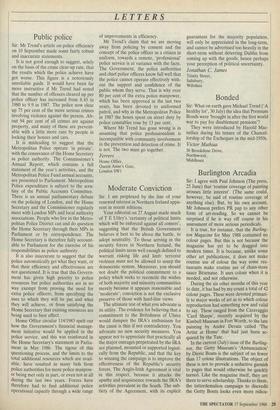LETTERS Public police
Sir: Mr Trend's article on police efficiency on 10 September made some fairly robust and inaccurate statements.
It is not good enough to suggest, solely on the basis of the crime clear-up rate, that the results which the police achieve have got worse. This figure is a notoriously unreliable guide. It would have been far more instructive if Mr Trend had noted that the number of offences cleared up per police officer has increased from 8.45 in 1980 to 9.9 in 1987. The police now clear up 75 per cent of the more serious crimes involving violence against the person. Ab- out 94 per cent of all crimes are against property, and many of these are prevent- able with a little more care by people in locking their houses and cars.
It is misleading to suggest that the Metropolitan Police operate 'in private', with the connivance of the Home Secretary as police authority. The Commissioner's Annual Report, which contains a full statement of the year's activities, and the Metropolitan Police Fund annual accounts, are presented to Parliament. Metropolitan Police expenditure is subject to the scru- tiny of the Public Accounts Committee. There is an annual parliamentary debate on the policing of London, and the Home Secretary and the Commissioner regularly meet with London MPs and local authority associations. People who live in the Metro- politan Police District can and do question the Home Secretary through their MPs in Parliament or by correspondence. The Home Secretary is therefore fully account- able to Parliament for the exercise of his responsibilities as police authority.
It is also inaccurate to suggest that the police automatically get what they want, or that their efficiency and effectiveness are not questioned. It is true that this Govern- ment has given high priority to police resources but police authorities are in no way exempt from proving the need for extra police officers, from specifying the uses to which they will be put and what they will achieve, or from satisfying the Home Secretary that existing resources are being used to best effect.
Home Office circular 114/1983 spelt out how the Government's financial manage- ment initiative would be applied in the police service, and this was reinforced in the Home Secretary's statement in Parlia- ment in May 1986. The rigour of this questioning process, and the limits to the total additional resources which are avail- able, have resulted in many bids from police authorities for more police manpow- er being met only in part, or even not at all during the last two years. Forces have therefore, had to find additional police operational capacity through a wide range of improvements in efficiency.
Mr Trend's claim that we are moving away from policing by consent and the concept of the police officer as a citizen in uniform, towards a remote, 'professional' police service is at variance with the facts. The Government, the police authorities and chief police officers know full well that the police cannot operate effectively with- out the support and confidence of the public whom they serve. That is why over 80 per cent of the extra police manpower, which has been approved in the last two years, has been devoted to uniformed patrol, and why in the Metropolitan Police in 1987 the hours spent on street duty by police constables rose by 13 per cent.
Where Mr Trend has gone wrong is in assuming that police professionalism is incompatible with community involvement in the prevention and detection of crime. It is not. The two must go together.
Ferrers
Home Office, Queen Anne's Gate, London SW1


































































 Previous page
Previous page